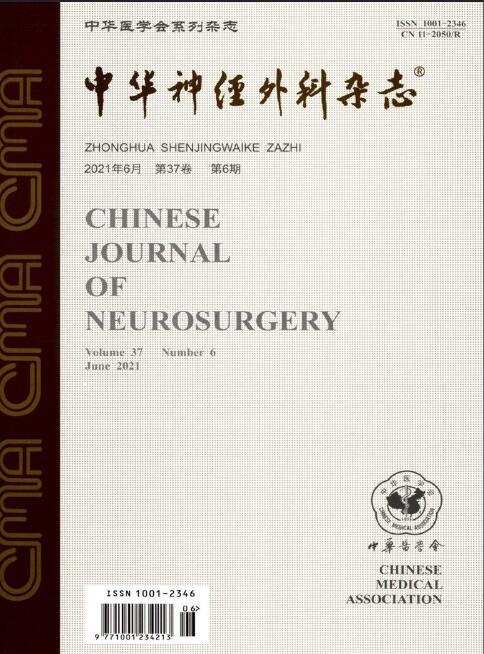中度颅脑损伤后认知功能障碍的影响因素分析
Q4 Medicine
引用次数: 0
摘要
目的分析中度颅脑损伤后认知障碍的影响因素,建立中度颅脑损伤认知障碍的预后模型。方法对2016年11月至2018年2月在中南大学湘雅三医院神经外科就诊的104例中度颅脑损伤患者进行前瞻性研究。使用蒙特利尔认知评估(MoCA)评分评估受伤后3个月的认知功能。使用单变量和多变量逻辑回归分析各种病变对认知功能的影响。根据逻辑回归分析结果建立预后模型。验证抽样用于计算预后模型的准确性、敏感性和特异性。结果Logistic回归分析显示,年龄(OR=1.118,95%CI:1.000-1.250,P=0.049)、教育程度(OR=0.202,95%CI:0041-0.988,P=0.045)、格拉斯哥昏迷量表(GCS)评分(OR=2.582,95%CI:1.442-5.369,P=0.011)和损伤原因(OR=0.429,95%CI:0.2001-0.915,P=0.029)是中度颅脑损伤后认知障碍的独立危险因素。基于入院危险因素的预后模型具有良好的性能(偏卡方检验P>0.05,曲线下面积0.902)。预测模型的准确性为88.6%,敏感性和特异性分别为55.6%和100.0%。结论年龄、文化程度、GCS评分和损伤原因是中度颅脑损伤后认知障碍的影响因素,建立的模型可用于及时、准确地预测中度颅脑损伤认知障碍的预后。关键词:颅脑损伤;认知障碍;物流模型;预测模型本文章由计算机程序翻译,如有差异,请以英文原文为准。
Analysis of influencing factors of cognitive impairment after moderate traumatic brain injury
Objective
To analyze the influencing factors of cognitive impairment after moderate traumatic brain injury and to develop prognostic models for cognitive impairment after moderate traumatic brain injury.
Methods
A prospective study was performed on 104 patients with moderate traumatic brain injury at Department of Neurosurgery, the Third Xiangya Hospital, Central South University from November 2016 to February 2018. The cognitive function at 3 months after injury was assessed using the Montreal cognitive assessment (MoCA) score. The impact of various lesions on cognitive function was analyzed using univariate and multivariate logistic regression. Prognostic models was established based on logistic regression analysis results. The validation sampling was used to compute the accuracy, sensitivity and specificity of the prognostic models.
Results
Logistic regression analysis revealed that age (OR=1.118, 95%CI: 1.000-1.250, P=0.049), education (OR=0.202, 95%CI: 0.041-0.988, P=0.045), Glasgow coma scale (GCS) score (OR=2.582, 95%CI: 1.242-5.369, P=0.011) and injury cause (OR=0.429, 95%CI: 0.201-0.915, P=0.029) were independent risk factors of cognitive impairment after moderate traumatic brain injury. The prognostic model based on the risk factors of admission had favorable performance (P>0.05 for partial chi square test, 0.902 for area under curve). The accuracy of the prognostic model was 88.6%. The sensitivity and specificity were 55.6% and 100.0% respectively.
Conclusions
Age, education, GCS score and injury cause are influencing factors of cognitive impairment after moderate traumatic brain injury, based on which the established model could be used to timely and accurately predict the prognosis of cognitive impairment after moderate traumatic brain injury.
Key words:
Craniocerebral trauma; Cognitive disorder; Logistic models; Forecasting models
求助全文
通过发布文献求助,成功后即可免费获取论文全文。
去求助
来源期刊

中华神经外科杂志
Medicine-Surgery
CiteScore
0.10
自引率
0.00%
发文量
10706
期刊介绍:
Chinese Journal of Neurosurgery is one of the series of journals organized by the Chinese Medical Association under the supervision of the China Association for Science and Technology. The journal is aimed at neurosurgeons and related researchers, and reports on the leading scientific research results and clinical experience in the field of neurosurgery, as well as the basic theoretical research closely related to neurosurgery.Chinese Journal of Neurosurgery has been included in many famous domestic search organizations, such as China Knowledge Resources Database, China Biomedical Journal Citation Database, Chinese Biomedical Journal Literature Database, China Science Citation Database, China Biomedical Literature Database, China Science and Technology Paper Citation Statistical Analysis Database, and China Science and Technology Journal Full Text Database, Wanfang Data Database of Medical Journals, etc.
 求助内容:
求助内容: 应助结果提醒方式:
应助结果提醒方式:


